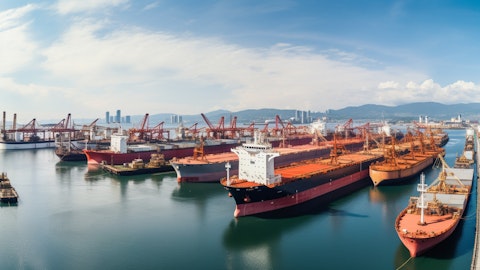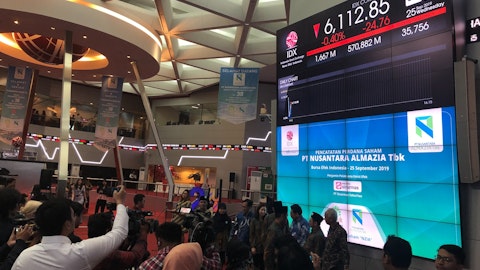Chris Carlson: Yes, great question, Brian. So, yes, that is strictly around the term debt coming due within a 12 month window of the filing. So, gap requires us to disclose that. As noted, we’re very focused on a refinancing and we feel very good about where we’re at. We’ve got 11 months to do that. So that process is underway today.
Brian Butler: Okay. And then on the conventional, when you think about getting the hydrocracker back to conventional production, can you maybe give at a high level how we should think about gross profit EBITDA and maybe sensitivity kind of to the spread as we get to a run rate in 2025 for that conventional business? I mean, how much EBITDA can that generate or and how sensitive is that to the spread?
Chris Carlson: Yes, I mean, the best thing to do would be look back at, as James noted, Q4 2022, look at that yield slate and you basically see that we will produce more gasoline, more diesel and jet and less VGO. As far as exposure to the market and cracks, it’s still the same. There’s no difference.
Brian Butler: Okay. And then last one on renewable diesel, where does the D4 RIN or the LCF as credit and feedstock costs really need to be for you guys to go back and reconsider starting back renewable diesel production?
Ben Cowart: Yes, I mean, I think if you look back historically, we’d need to see a margin environment similar to the margin environment that existed when we made this investment decision, which was again, if you look at 2022 and maybe even first quarter 2023, I think, before the curves really collapsed. But again, I think if you looked at those values in, on a kind of annual average in 2022, by and large, that would certainly incentivize us to fully evaluate converting back at an upcoming catalyst change if those were the curves we were looking at, that would make that a viable candidate at that time. If you look at the – certainly the margin environment, in most of 2023 and certainly what it’s been in 2024 thus to-date then obviously very unattractive.
Brian Butler: Okay. And I guess, tied to that, would you have to go through the whole certification pathway again for the D4 the BTC and the credits, is that like another – would be a whole another group of hurdles to get over?
Ben Cowart: No, we can preserve those. We have a timeframe. We’ve got certain things we have to do to be able to preserve those administratively, but we’ll continue to preserve those in the future as long as we can.
Brian Butler: Okay, great. Thanks for taking my questions.
Ben Cowart: Thanks.
Operator: Our next question comes from Jason Gabelman from TD Cowen. Your line is now open.
Jason Gabelman: Hey, good morning. Thanks for taking my questions. I missed some of the calls, so apologies. This has already been discussed, but the offtake agreement with Idemitsu, are there – that was for the renewable diesel product. Are there any commitments that you’ll have to follow through on despite shutting down the renewable diesel production or is there any cost associated with ending that contract?
Doug Haugh: Well, I guess to clarify, it’s Doug here. We don’t intend to end that contract, continue to have a very good relationship with Idemitsu in all regards. So, we want that contract to continue, should we resume renewable production. So that’s our belief is that Idemitsu value that as well. And that’s our current indication. So it’s more of a pause than a cessation in permanent terms. And that’s a fairly long-term contract. So it currently goes beyond our next sort of window when we would evaluate this again. There are some operational obligations for both of us in that arrangement that we’re working through and dealing with currently. Is there residual costs in our systems on a go-forward basis coming out of this potentially, not definitively, but certainly potentially associated with Idemitsu.
And then we also have storage capacity in Mobile that’s secured specifically to support RD that we believe we have uses for and can trade around those assets and make use of those rents that we’re paying on those tanks. But there’s a tail on the tank rents too.
Jason Gabelman: Okay. But to be clear, you don’t have to go out and buy renewable diesel in the open market to fulfill some sort of contractual obligation moving forward.
Doug Haugh: No, the Idemitsu is a production offtake agreement, not a guaranteed production agreement. So it flexes with our production.
Jason Gabelman: Okay, thanks. And then my other one was just on maybe some of the cash benefits from ending the renewable diesel service. Can you provide a working capital benefit that you expect to get from running down that feedstock? And then is there any offset from building more conventional related inventories?
Chris Carlson: Yes, I mean, from the RD perspective, I don’t see a big benefit in working capital as we look at running this down. On the conventional, as you know, we’ve got the financing agreement for our inventory flowing through. So there shouldn’t be a big change in working capital as we transition.
Jason Gabelman: Okay, great. Yes, sorry.
Ben Cowart: Say the only difference is the refined products will go up a bit because we’re making more of them and some of those move via vessels. So you’ll see builds as you build inventory to load the ship. But similar to what we do with jet today. So that’d be the only material difference that you’ll see in the inventory side.
Jason Gabelman: Got it. Great. Thanks for the answers.
Operator: As of right now, we don’t have any pending questions. I’d now like to hand back over to Mr. Ben Cowart, CEO. Thank you.



